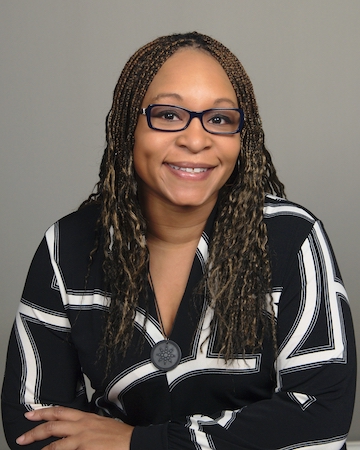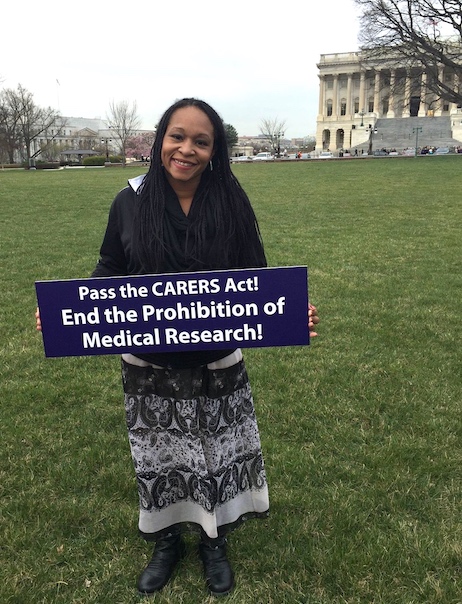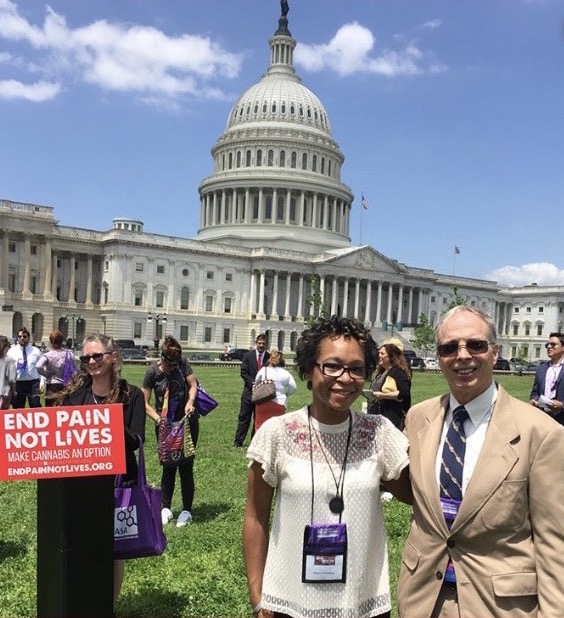Katree Saunders, Las Vegas, Nevada
For anyone who believes that passing adult-use laws fixes problems for patients, that medical cannabis use doesn’t get anyone in trouble, or that being a patient can’t cause problems for people, Katree Saunders is here to tell you different.
 Katree discovered more than a decade ago that cannabis helped control her chronic pain from accident-related injuries, enabling her to get off the opioid painkillers she’d taken since she was 15. At first, like many patients, she was accessing cannabis on the underground market through friends and acquaintances. But in 2008, she was sexually assaulted by a cannabis provider she had known for many years.
Katree discovered more than a decade ago that cannabis helped control her chronic pain from accident-related injuries, enabling her to get off the opioid painkillers she’d taken since she was 15. At first, like many patients, she was accessing cannabis on the underground market through friends and acquaintances. But in 2008, she was sexually assaulted by a cannabis provider she had known for many years.
“After that, I went into a spiral of depression,” Katree says. “I didn’t feel safe anymore.”
Not long after, she happened across a listing for medical marijuana in a phone book and, after wondering if it was real, connected with a doctor who certified her for participation in the Nevada medical cannabis program. She got her card, but she still had no convenient means of legal access.
At the time, being a registered patient was only a protection against going to jail for possession of cannabis. It would be half a dozen years before Nevada licensed medical cannabis dispensaries to operate. When she asked what she was supposed to do, she was referred to the Nevada state Department of Agriculture. The only way to obtain medical cannabis it was to cultivate it yourself or find a caregiver who could.
“I wanted to help others because I knew what women faced on the streets,” she says. “A lot of time women need flower but don’t want to be put in the position I had experienced. I had to advocate for safe access.”
Katree met Michael McAuliffe, who was facilitating a patient cooperative. When he opened Nevada Compassionate Care in early 2010 to provide consulting services for patients and help with paperwork and documentation, Katree was part of the team.
Then, a few months later, President Obama came to town for a health care rally with Organizing for America. Katree and a friend volunteered to help with the event and ended up seated in the front row right behind the President’s podium. Friends had joked with Katree that if she got to meet President Obama she had to ask about medical marijuana.
“I thought, oh my God, I can ask him, I’m going to get to ask,” Katree remembers. “So after his speech, I told him how much cannabis helped me with opiates. He said he wasn’t prosecuting and shook my hand.”
Katree was inspired and reassured. “This is awesome” she thought.
But the Drug Enforcement Administration (DEA) wasn’t done in Nevada. In December 2010, Katree was swept up in a large DEA operation in Las Vegas -- Operation Chronic Problem – that targeted Nevada Compassionate Care and several other local medical cannabis businesses, resulting in 15 arrests. Katree had been approached by an undercover federal agent pretending to be a patient in need, who begged her for help obtaining a small amount of cannabis. She got $100 worth of cannabis for him.
 At age 30, recently married and mother of a small baby, she was facing federal charges. Then, driving to one of the drug classes that were part of her pretrial release, their car got hit by another driver, and Katree suffered another traumatic injury to her brain, back and neck.
At age 30, recently married and mother of a small baby, she was facing federal charges. Then, driving to one of the drug classes that were part of her pretrial release, their car got hit by another driver, and Katree suffered another traumatic injury to her brain, back and neck.
“All the pills I had just gotten off, I had to restart because no cannabis use was allowed,” Katree says. She was prescribed Marinol, the synthetic THC pills, and morphine, but the health insurance she had through her husband’s employer only covered the opioids. At one point or another, she was prescribed Xanax, Valium, morphine, and hydrocodone.
With a husband working a new job in banking and a baby to care for, Katree elected to take a plea deal to avoid a trial and potential prison time. The terms of her four years of federal probation included drug testing for cannabis. Those tests cannot distinguish between cannabis and prescription Marinol, but that wasn’t a problem for several years--until she got a new probation officer.
“My new probation officer did not like the positive drug tests,” she says. He contacted her doctor and got a court order to void the prescription. He used her positive tests and contact with two physicians about Marinol to violate her probation in 2014.
“I got four months in prison; I lost everything,” Katree says. “I was a stay-at-home mom, but while I was in prison my husband got offered a promotion and raise to transfer to Ohio. He took the job, divorced me and took the kids.”
Katree had to start over from scratch. She decided that she was going to get out, clear her name, and get a job in the cannabis industry that was starting to get off the ground in Nevada.
 In October 2016, she got a state license and went to work serving patients at dispensaries, cultivation and edible companies. At the time, only a Nevada state felony conviction barred people from being part of the cannabis industry.
In October 2016, she got a state license and went to work serving patients at dispensaries, cultivation and edible companies. At the time, only a Nevada state felony conviction barred people from being part of the cannabis industry.
In 2019, after taking a few months off work to visit and spend time with her children, she returned to Nevada and tried to get a new card to work again.
In June, the Nevada Department of Taxation denied her renewal request, even though she had worked previously at five dispensaries. With the passage of an adult-use cannabis law had come new regulations. Now, any felony conviction bars you from working.
“When I asked about social justice, they told me “We’re setting aside money, but you’re a nobody,” Katree says. That hasn’t stopped her. Katree continues to advocate for patients and operates Kannabis Kouture, a cannabis education page she started on Facebook in 2015.
Katree is also continuing the advocacy work she’s been committed to since she got out of prison. She has been part of ASA campaigns for years and has traveled to Washington, D.C. to lobby Congress during ASA’s annual National Medical Cannabis Unity Conference. Katree has also been working with the Last Prisoner Project on filing clemency requests and is deeply involved with improving the cannabis laws in Nevada.
“My work with ASA has allowed me to use my voice to help incite change,” Katree says. “I am always thankful for the support and guidance so I can shed light on some of the social justice issues I have faced being a medical cannabis patient trying to obtain safe access. It’s been super impactful
This profile was originally published in the March 2021 ASA Activist Newsletter
Share this page






















